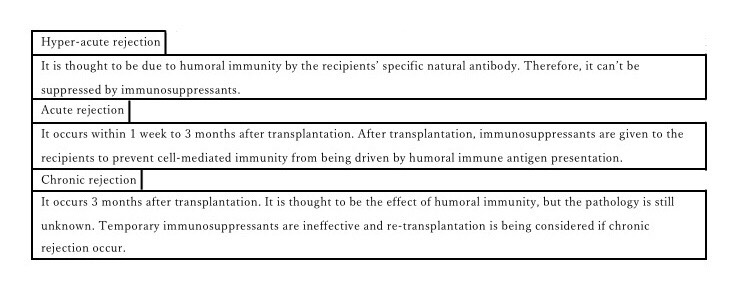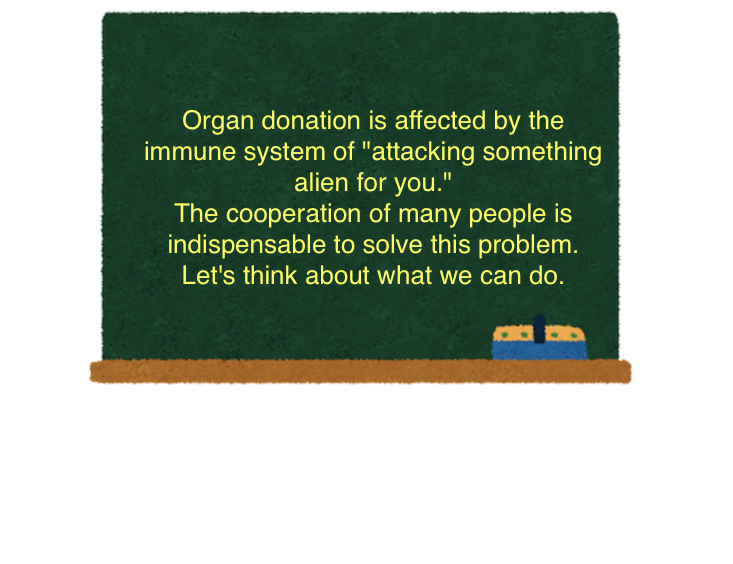Transplant
Organ transplantation
Organ transplantation is a treatment method in which a healthy organ is transplanted to a person whose organs (heart, lungs, liver, kidneys, pancreas, small intestine, etc.) have failed to function normally due to illness or accident.
Therefore, no matter how advanced doctors and techniques are, it is a treatment that cannot be achieved without a person who donates organs.
Type of transplant

Transplantation may have the image of a deceased person, but it can also be transplanted from a healthy person.
Current status of organ transplantation
Nearly 13000 donors are registered with the Japan Organ Transplant Network.
However, there are about 100 people per year who die without a transplant even though they need it.
Reference)The recent organ transplants done in Japan in one year are
・About 1300 cases of kidney transplantation
・About 500 cases of liver transplantation
・Others about 10 cases of heart and lung transplantation
Bone marrow transplantation
Bone marrow transplantation is a treatment in which bone marrow collected from a donor with a better match for HLA antigens is injected into the recipient.
Since it is a treatment that replaces bone marrow fluid that does not function properly due to illness with bone marrow fluid of a healthy person, the concordance rate such as HLA antigens must be higher than that at the time of organ transplantation.
Current status of bone marrow transplantation
Currently, there are about 530000 applicants and the number of registered donors is also about 530000.
Considering the HLA antigen concordance rate, it is clear that there are few donors.
Transplantation and rejection
Rejection is a reaction that occurs when a receives an organ of a donor.
In order to avoid rejection of the transplanted organ(transplant reaction), it is necessary to consider compatibility with the recipient and use immunosuppressants after transplantation.
Suitability is judged by the matching and compatibility of HLA(Human Tumor Tissue Compatible Antigen) type, which is a human MHC molecule.
In organ transplantation, matching the blood group HLA of the donor and recipient as much as possible results in long-lasting organ function after transplantation.
Before transplantation, we confirm that there is no recipient's antibody against the donor's antigen (lymphocyte crossmatch, crossmatch test) to prevent severe rejection.
Rejection varies from person to person in the time it occurs, but if left untreated, the organs will be damaged and it will not function normally.
However, it is very difficult to find a donor because the number of combinations is very large, the probability of an exact match is one-fourth even for siblings, and otherwise it is one in thousands to tens of thousands.
Types of rejection
There are three types: hyper-acute rejection, acute rejection, and chronic rejection.
Immunosuppressants are also used to prevent acute rejection.

What we can do
In order to minimize rejection when organ transplantation is performed, the donor and recipient types must be matched as much as possible. With the small number of organs that can be transplanted, it is difficult to match them, but the situation may be changed just by expressing our intention to transplant organs.
It may be important to talk with your family, know and have an Organ Donation Decision Card.
Also, bone marrow transplants require a higher concordance rate than organ transplants and they require more donors.
To save as many patients as possible, we can start by registering as a donor.
There is a limit to what we can do, but we should take action even within that limit.
Summary


